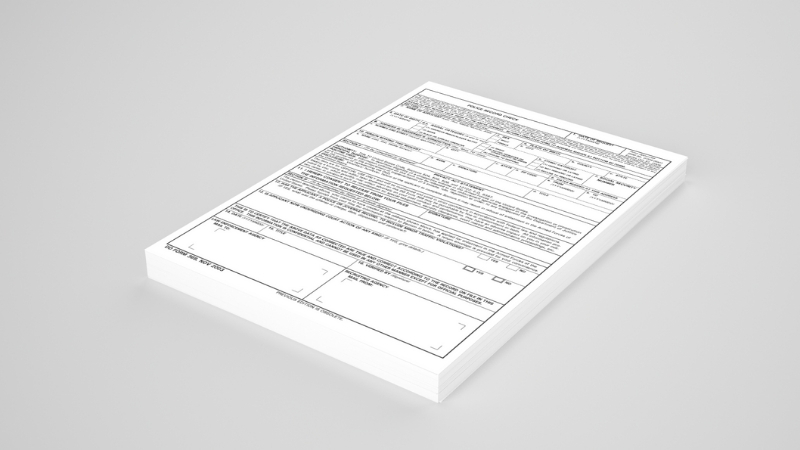Joining the Army is more than proving you can run two miles and knock out push-ups. Before you ever set foot in basic training, you’ll go through multiple layers of vetting – starting at your recruiter’s desk and Military Entrance Processing Station (MEPS), and in some cases extending into a full national-security background investigation.
If your future role requires a clearance, you’ll be monitored the entire time you serve.
Here’s a clear, practical guide to what gets checked, why it matters, and how the Army evaluates each area of risk.
How the Process Works
Before we get into specifics, it helps to picture the flow:
Step 1 – MEPS Screening
At MEPS, you’ll confirm your identity, complete a medical exam, provide fingerprints, take a urinalysis, and go through basic legal eligibility checks.
Step 2 – Security Vetting (if needed)
For certain specialties, you’ll complete a detailed security questionnaire (SF-86 or its digital replacement, the eApp). That starts a federal investigation under the 13 adjudicative guidelines used across the government.
Step 3 – Continuous Monitoring
If your job requires a clearance, your eligibility is never “set and forget.” The Defense Department uses automated record checks to detect new issues while you’re in.
Quick Reference Table
Area Checked
What They Look For
Where It Happens
What You’ll Do
Identity & Legal Presence
Correct identity, citizenship or permanent residency
Recruiter, MEPS
Bring a valid ID and proof of status
Criminal History
Arrests, charges, convictions, warrants
Recruiter, MEPS, national checks
Fingerprints; local police checks (DD 369)
Domestic Violence Prohibitions
Convictions or orders banning firearm possession
Recruiter, MEPS, unit
Complete DD 2760; firearm bans may disqualify
Drugs & Alcohol
Use, abuse, dependence, current use
MEPS, later checks
Urinalysis: disclose history honestly
Finances & Credit
Heavy debt, defaults, unexplained affluence
Security vetting
Consent to credit pull; explain issues
Foreign Ties & Travel
Dual citizenship, foreign contacts, relatives abroad
Security vetting
List contacts, travel, passports
Personal Conduct
Honesty, candor, patterns of misconduct
All stages
Be truthful in all forms
Social Media (Public)
Posts tied to risk factors
Security vetting
Public content can be reviewed
Education, Jobs, Addresses
10-year history
Security vetting
Provide dates, references, and supervisors
Medical & Mental Health
Conditions affecting fitness
MEPS
Bring records; disclose history
Ongoing Monitoring
New arrests, financial issues, security concerns
Continuous vetting
Keep records clean, report changes
1. Identity and Legal Presence

You must be a U.S. citizen or a lawful permanent resident with a valid Green Card to enlist. For officers, citizenship is required by commissioning. The Army verifies your status through DHS’s SAVE system.
What It Means for You
Bring original, valid documents: birth certificate, passport, or Green Card. Errors or mismatches can slow your processing and trigger extra checks.
Audit your online presence with tools or services like Reputation Recharge to remove or address risky content.
2. Fingerprints and FBI Checks
At MEPS, you’ll be fingerprinted using live-scan technology. Those prints go to the FBI for a nationwide check.
If you later hold a national-security position, the FBI’s NGI Rap Back service can alert DoD to any new arrests.
What It Means for You
Expect this to be one of the first things you do at MEPS. Once you’re in a monitored role, new incidents will be flagged automatically.
3. Local Police and Court Records: DD Form 369

Your recruiter will have you sign DD Form 369, which allows local police to share records about arrests or charges, even minor ones. If you’ve lived in multiple places, expect to sign more than one.
What It Means for You
You can’t “hide” an old ticket or juvenile matter. The Army is going to check every jurisdiction you’ve called home.
4. Arrests, Charges, Convictions, and Waivers
The Army may grant waivers for certain offenses, but serious crimes and recent incidents are harder to clear. New charges during processing trigger a fresh review.
What It Means for You
Tell your recruiter about everything, even sealed or expunged records. They can assess waiver chances before you get deep into processing.
5. Domestic-Violence Prohibitions

Under federal law (Lautenberg Amendment), anyone convicted of a misdemeanor crime of domestic violence or subject to certain restraining orders cannot possess firearms.
What It Means for You
If you fall under this restriction, your career options will be severely limited – sometimes to the point of ineligibility.
6. Drug Use History and Testing
You’ll take a urinalysis at MEPS. Any positive result or refusal is a permanent disqualifier.
For security roles, prior drug use is weighed under adjudicative guidelines, but honesty matters.
What It Means for You
Marijuana is still illegal under federal law for service members, regardless of state laws. Quit well before MEPS and disclose past use accurately.
7. Alcohol-Related Incidents
One DUI with evidence of rehabilitation may be explainable. Multiple incidents raise serious doubts about judgment and self-control.
What It Means for You
If you’ve had alcohol-related trouble, bring records of counseling or treatment. Show a clear change in behavior.
8. Financial History and Credit

Excessive debt, defaults, or large unexplained deposits can be red flags. The concern is vulnerability to coercion or corruption.
What It Means for You
Before your credit is pulled, resolve delinquencies where possible. Be ready to explain any major financial changes with documentation.
9. Foreign Ties, Travel, and Dual Citizenship
Investigators want to know about foreign relatives, dual passports, and extended overseas travel. The goal is to assess risk from foreign influence.
What It Means for You
Simply having a foreign family isn’t a problem. Not disclosing it is.
10. Personal Conduct and Honesty
Every form and interview is a consistency check. False statements can be prosecuted under 18 U.S.C. 1001 and will destroy your credibility.
What It Means for You
If something changes – a new job, an address, a traffic ticket – update your recruiter and security forms right away.
11. Publicly Available Social Media

Security investigators can review your public posts for signs of criminal activity, extremist associations, or other disqualifying behavior.
What It Means for You
Assume that anything public online could be reviewed. Adjust your privacy settings and think twice before posting.
12. Education, Employment, and Residence History
You’ll be asked for a 10-year history of where you’ve lived, worked, and studied, plus contact info for supervisors and references.
What It Means for You
Gather your dates and names now – the form won’t let you leave gaps.
13. Medical and Mental Health Disclosures
MEPS checks for conditions that affect readiness. Many are waiverable if managed and documented.
What It Means for You
Bring copies of your medical records and be honest about your history. Hiding an issue is far more damaging than admitting one.
14. Jobs That Require a Security Clearance
What are National Security Adjudicative Guidelines? If you are working in a cleared position or hoping to attain one, it is essential to know these: https://t.co/u0JoOmh7Ug pic.twitter.com/K6Rg5ddSKw
— Defense Counterintelligence and Security Agency (@DCSAgov) September 20, 2024
If your MOS requires a clearance, the Defense Counterintelligence and Security Agency will investigate your background under the 13 National Security Adjudicative Guidelines. Each case is judged in context.
What It Means for You
There is no automatic “yes” or “no.” Time passed, rehabilitation, and honesty carry weight.
15. Continuous Vetting After You Join
Clearance holders are now subject to continuous monitoring instead of periodic reinvestigations. Automated systems flag arrests, credit changes, and other risk indicators.
What It Means for You
Keep your legal, financial, and personal life stable. Report issues immediately.
What Happens at MEPS
Expect a structured day:
- Fingerprinting and ID check
- Urinalysis and lab work
- Medical exam under DoD standards
- Pre-Enlistment Interview to verify all disclosures
- If applicable, start the security clearance process
The 13 Adjudicative Guidelines
For clearance-required jobs, adjudicators consider:
- Allegiance to the U.S.
- Foreign Influence
- Foreign Preference
- Sexual Behavior
- Personal Conduct
- Financial Considerations
- Alcohol Consumption
- Drug Involvement and Substance Misuse
- Psychological Conditions
- Criminal Conduct
- Handling Protected Information
- Outside Activities
- Use of IT Systems
Practical Prep Checklist
View this post on Instagram
- Gather all IDs, immigration docs, diplomas, addresses, job references, court records, and medical files.
- Resolve or document financial issues.
- Stop drug use well before processing.
- Keep your story consistent across every form and interview.
- Audit your public online presence.
- Ask early about waiver eligibility if you have legal or medical history.
Final Words
The Army’s background check is about risk, trust, and readiness. You can’t control every factor, but you can control your preparation, your honesty, and how you present your history.
The more complete and consistent your information, the smoother your path into service will be.







